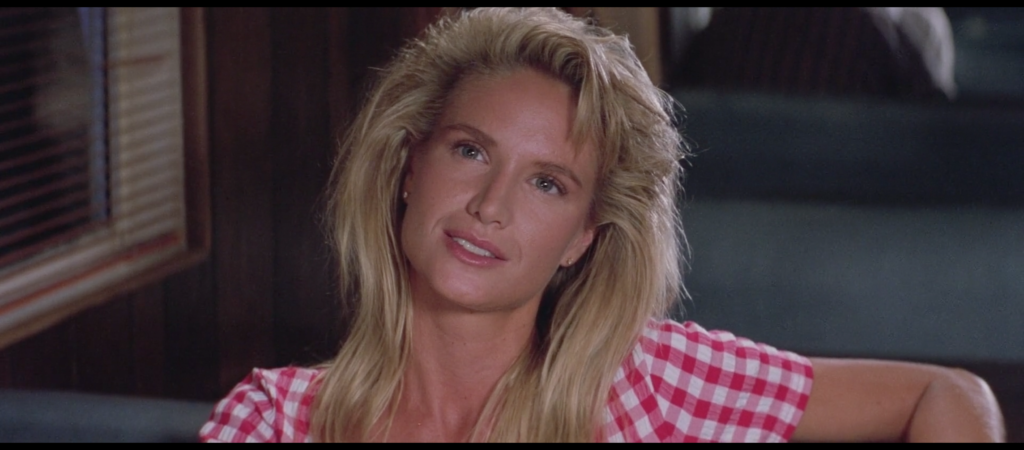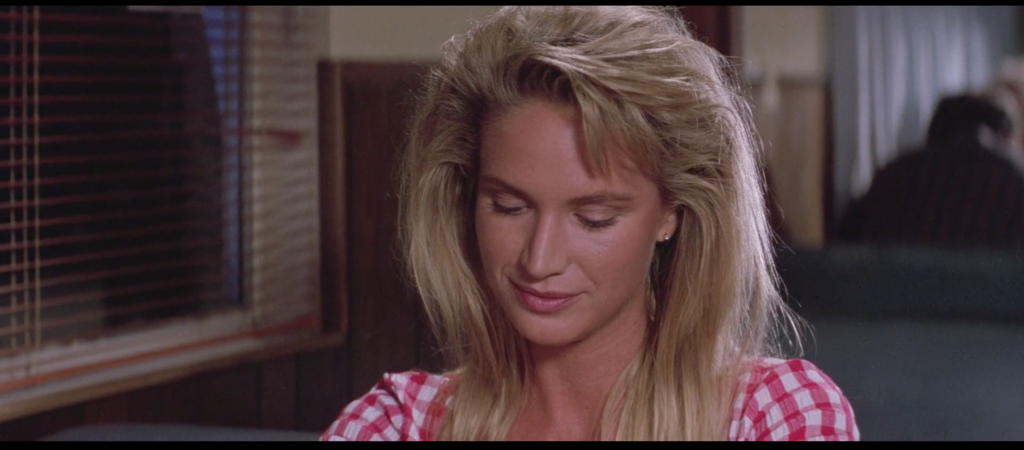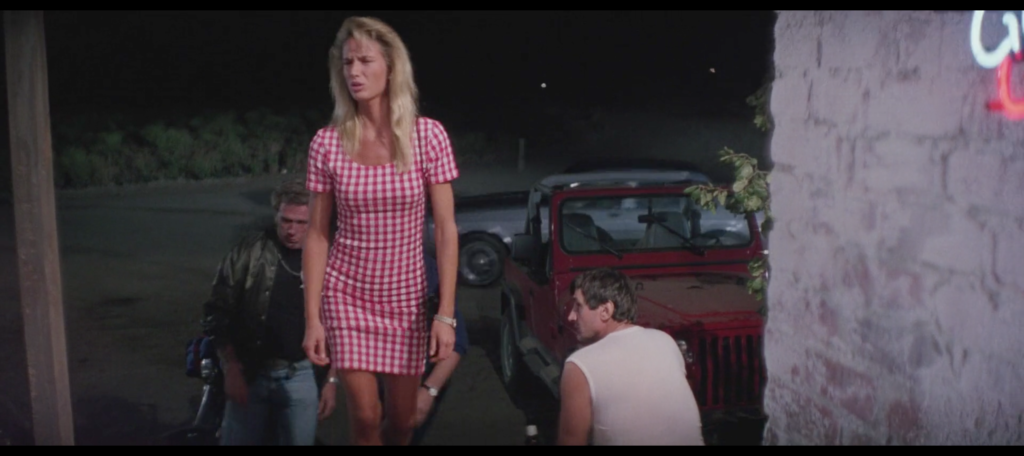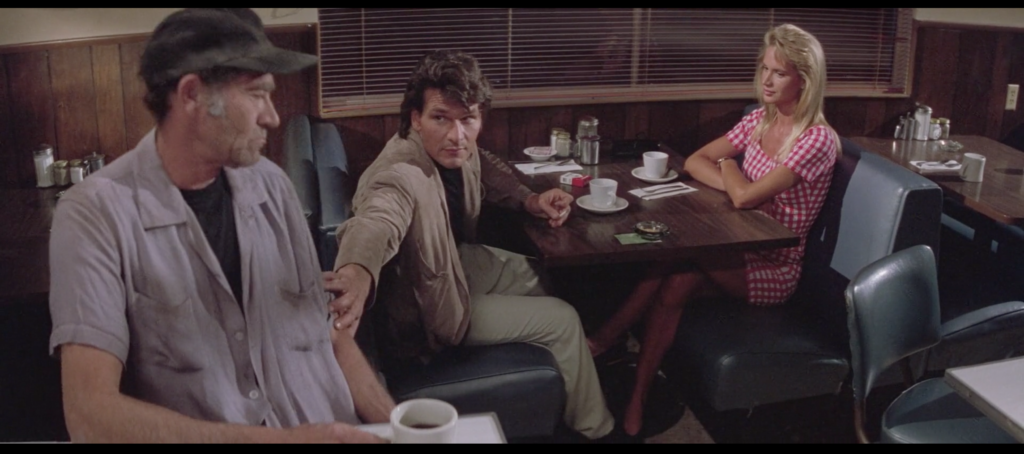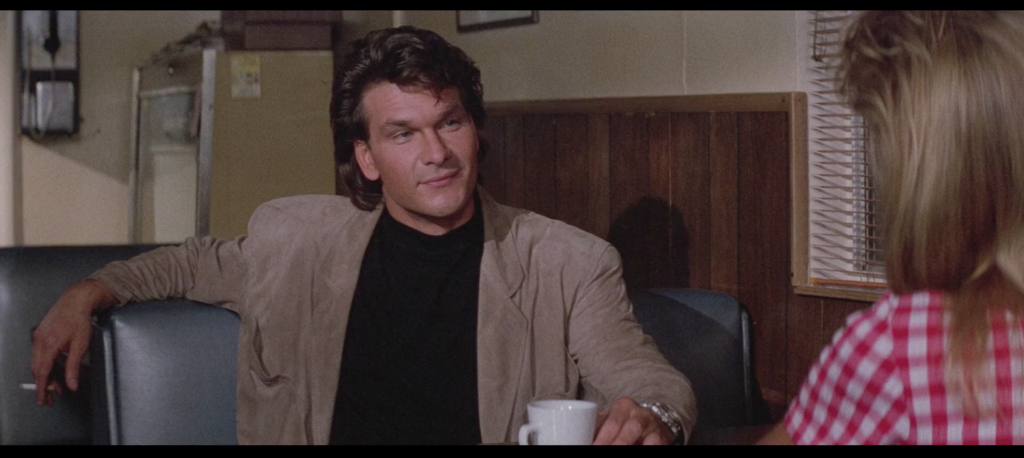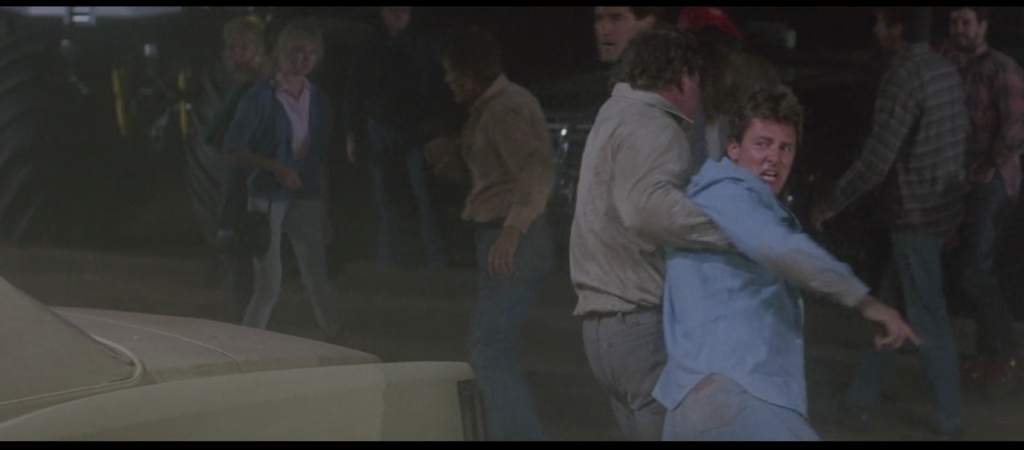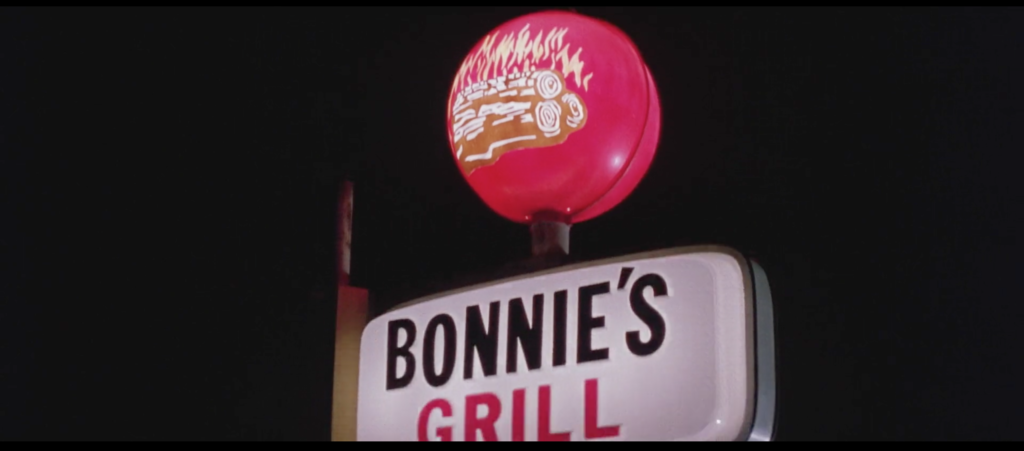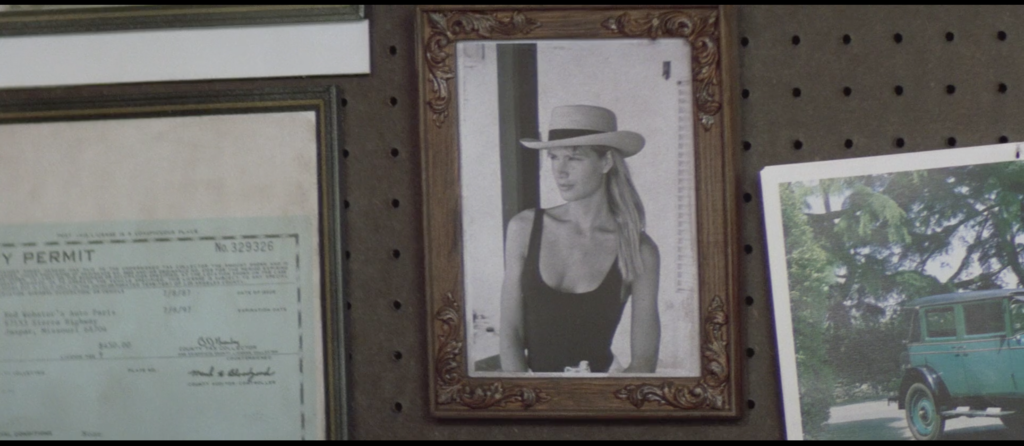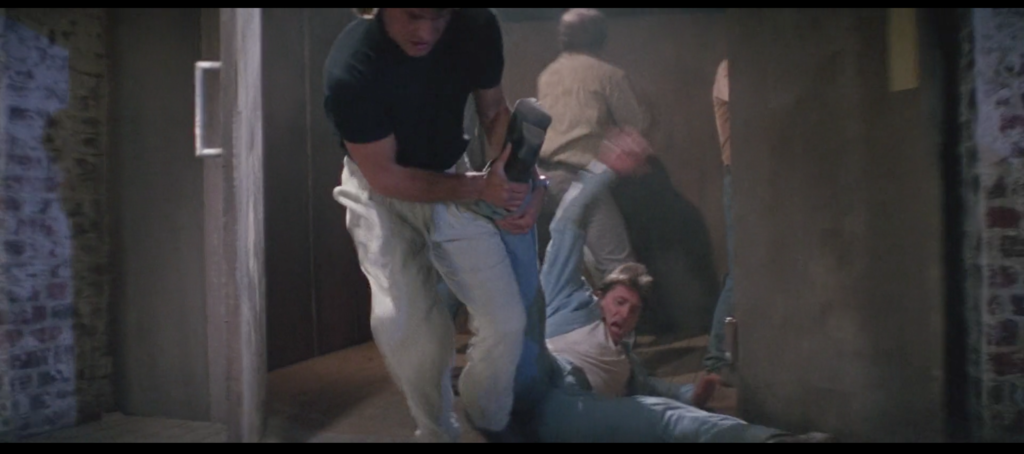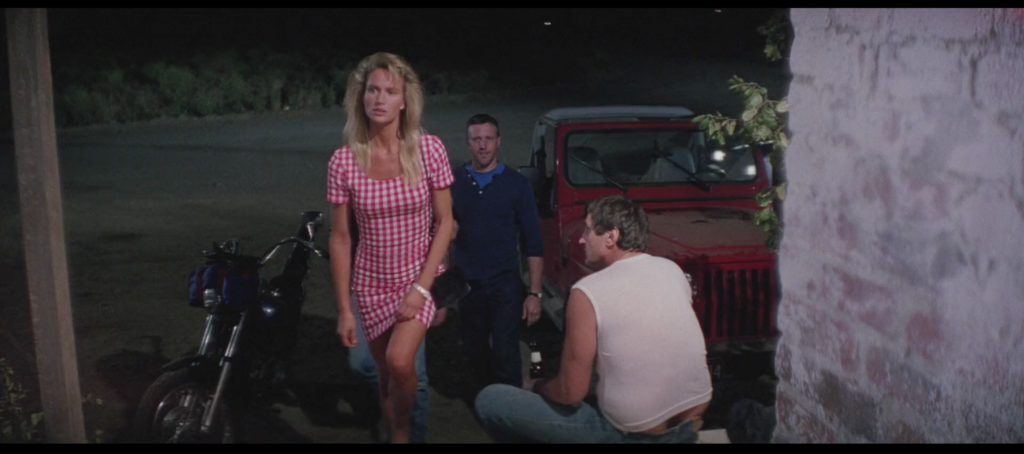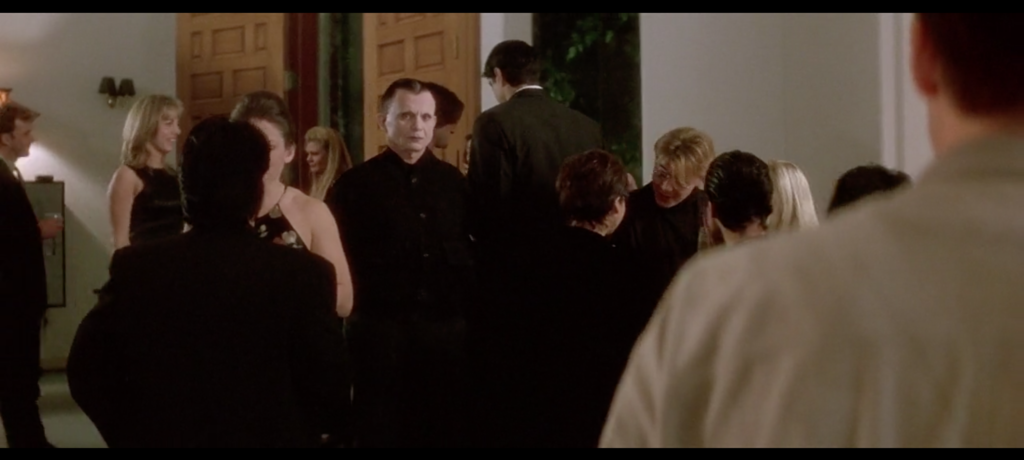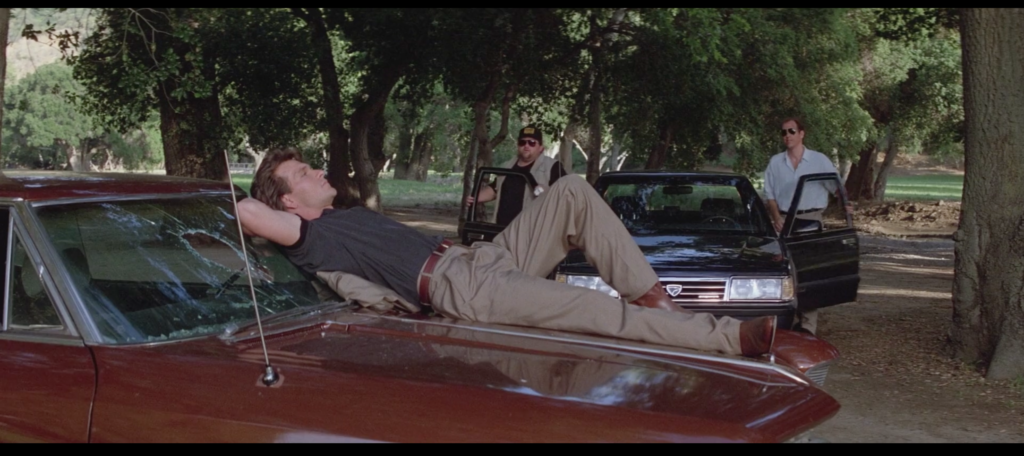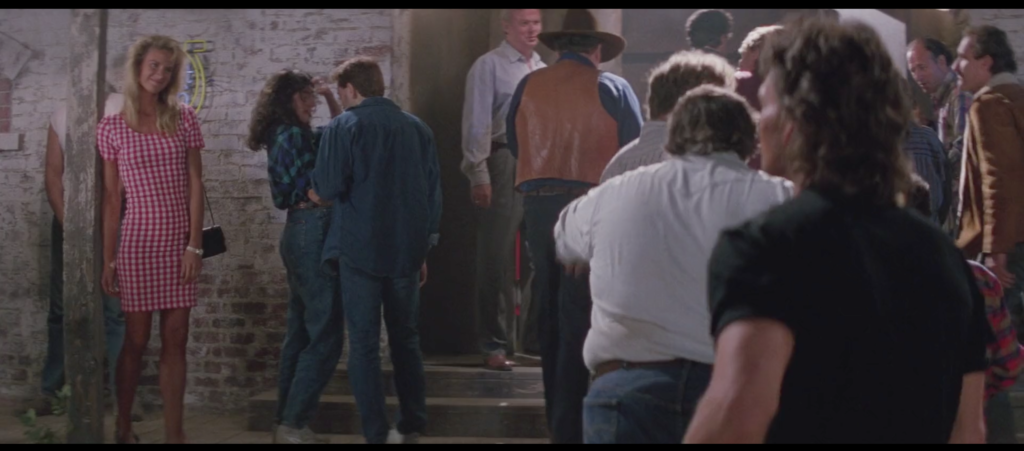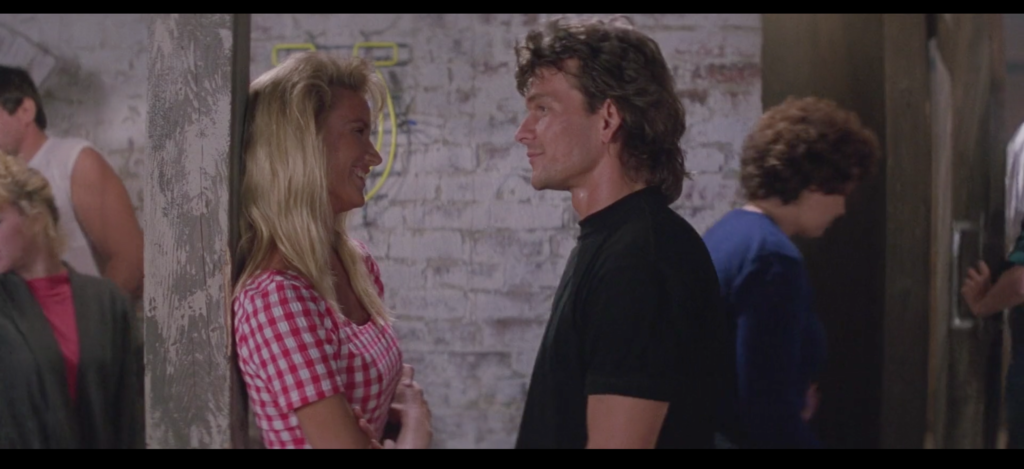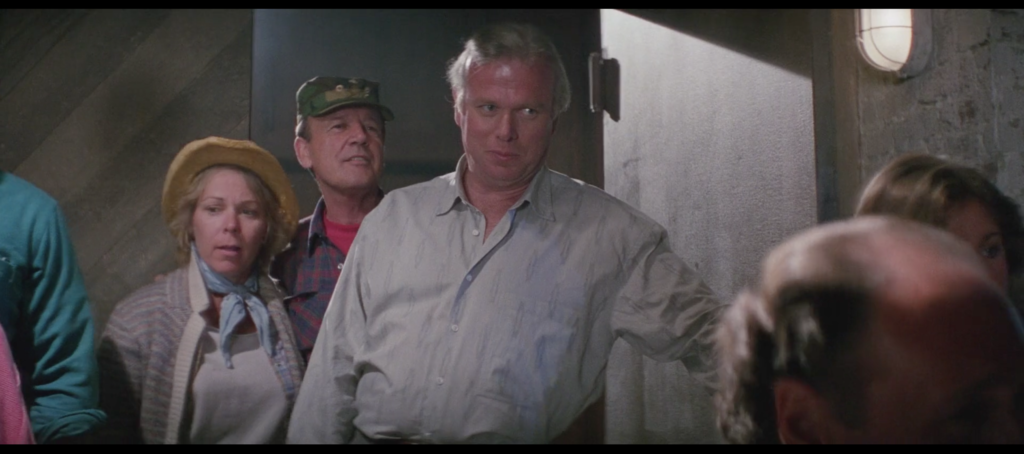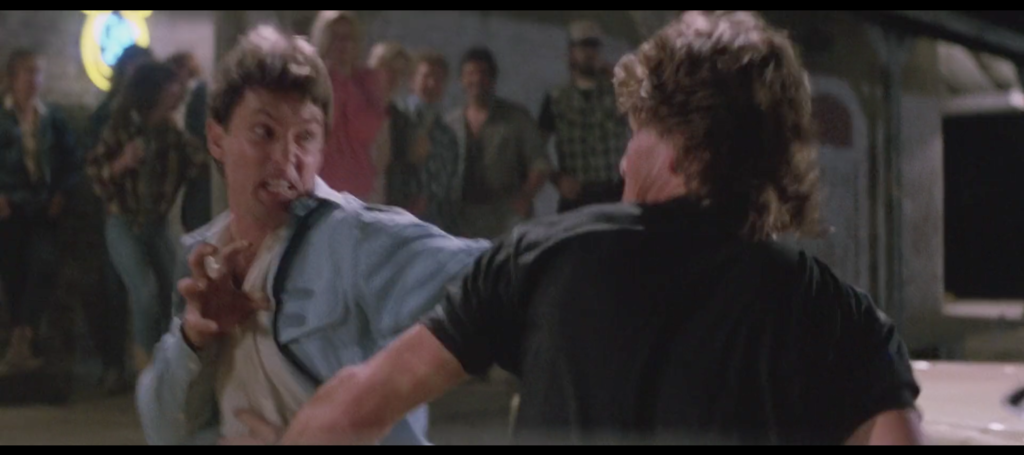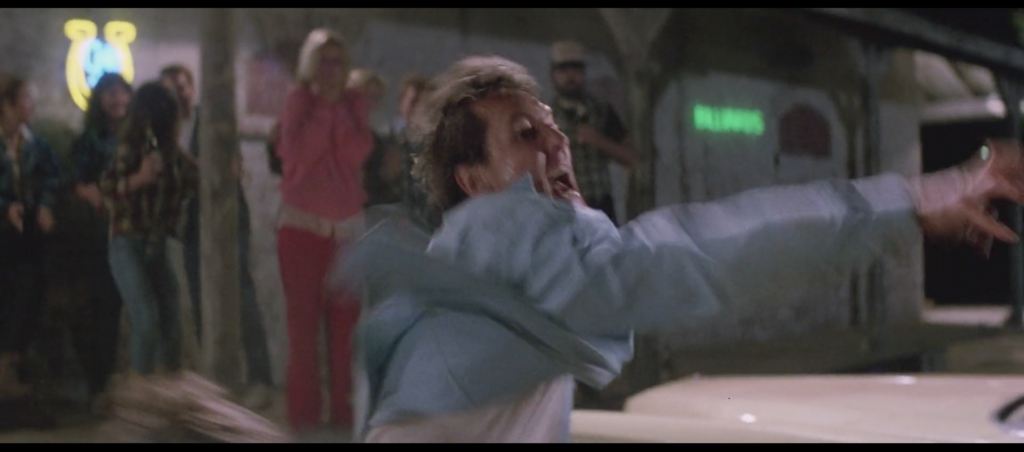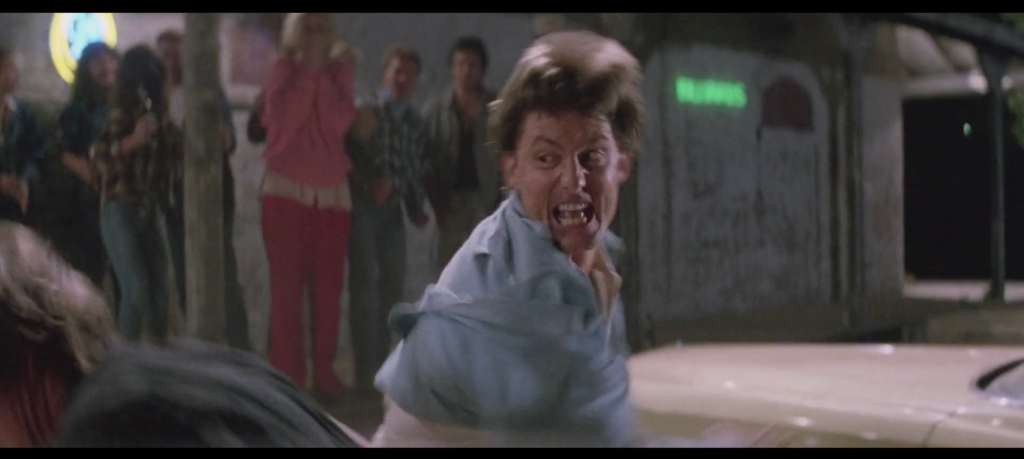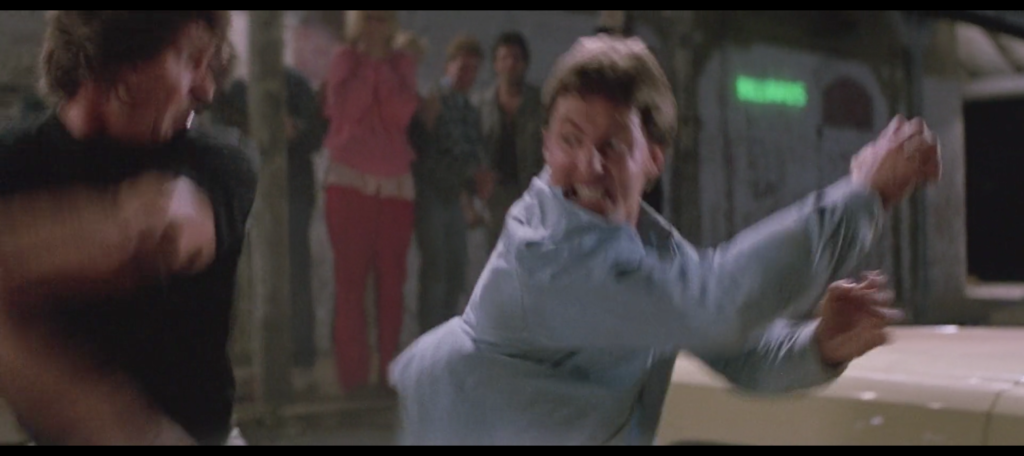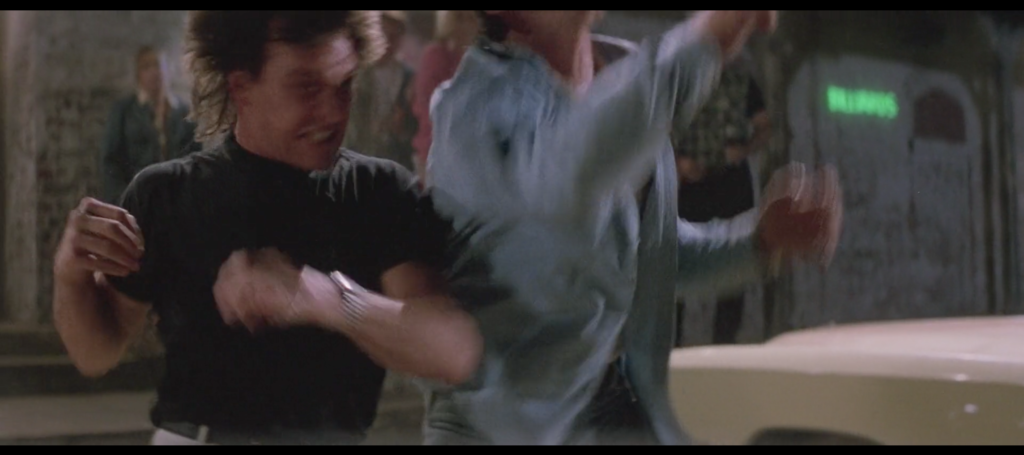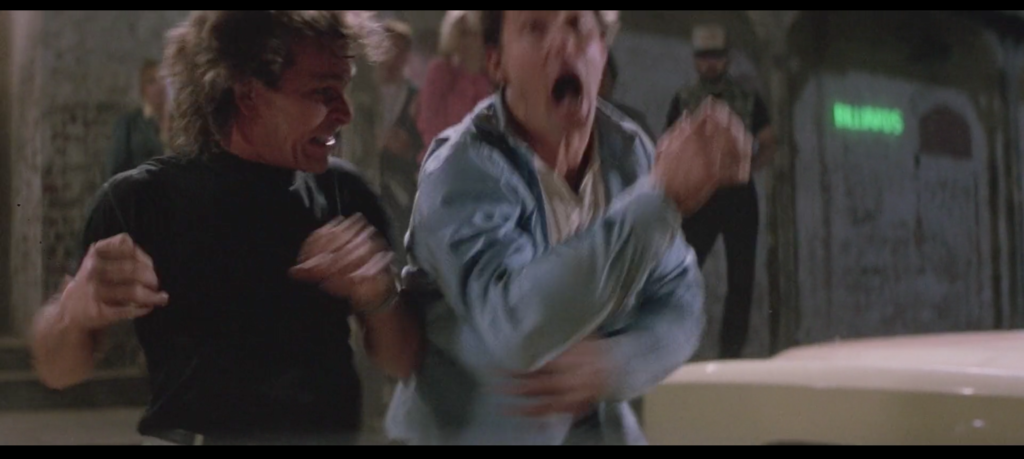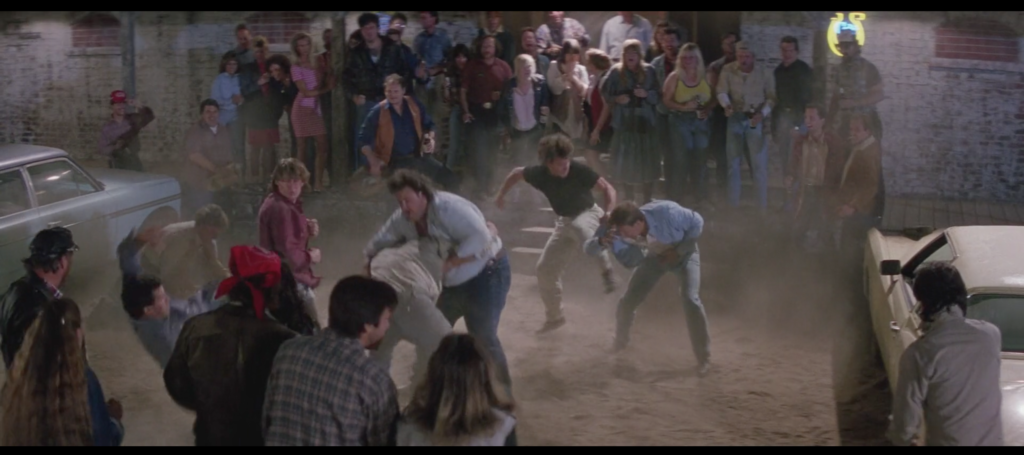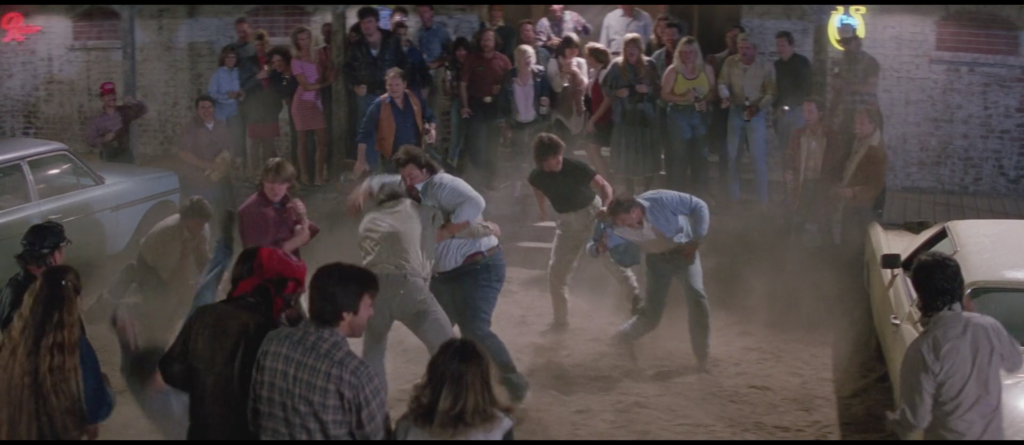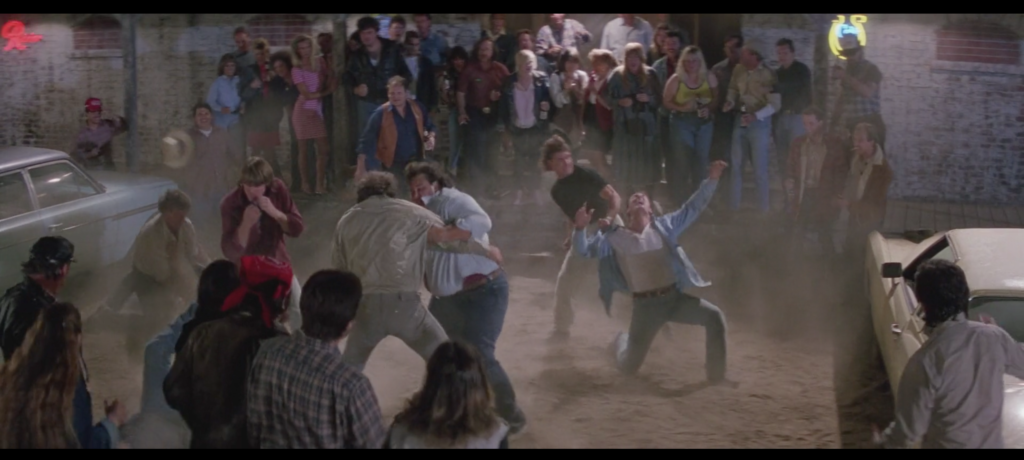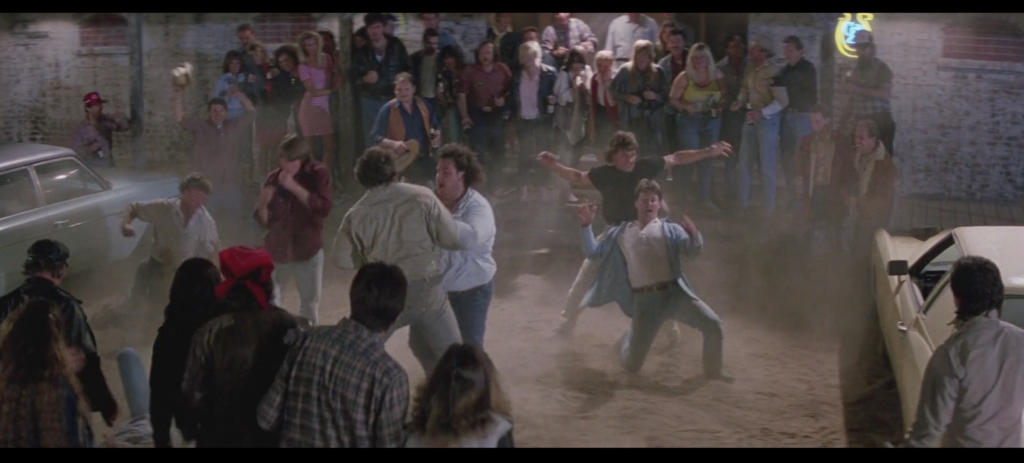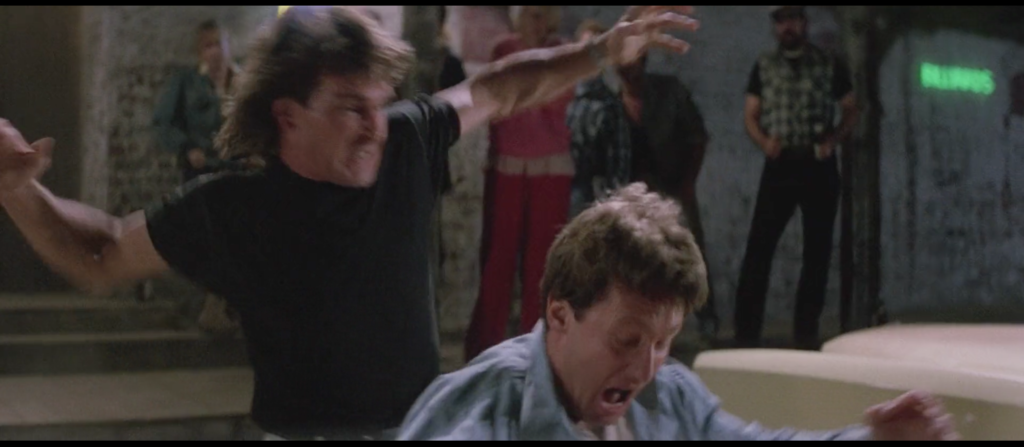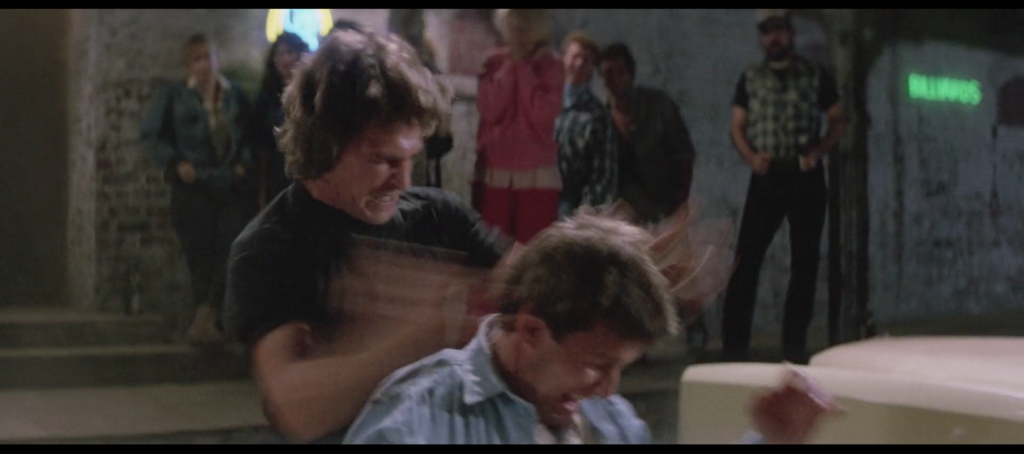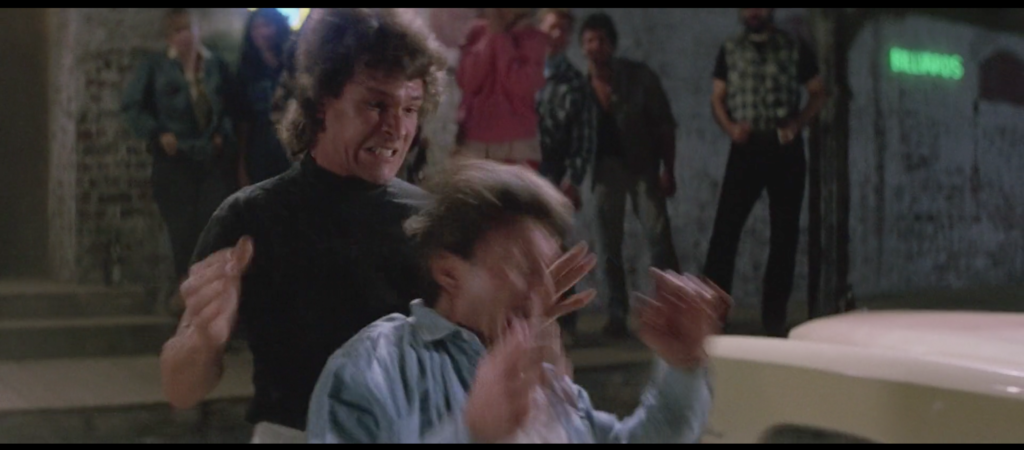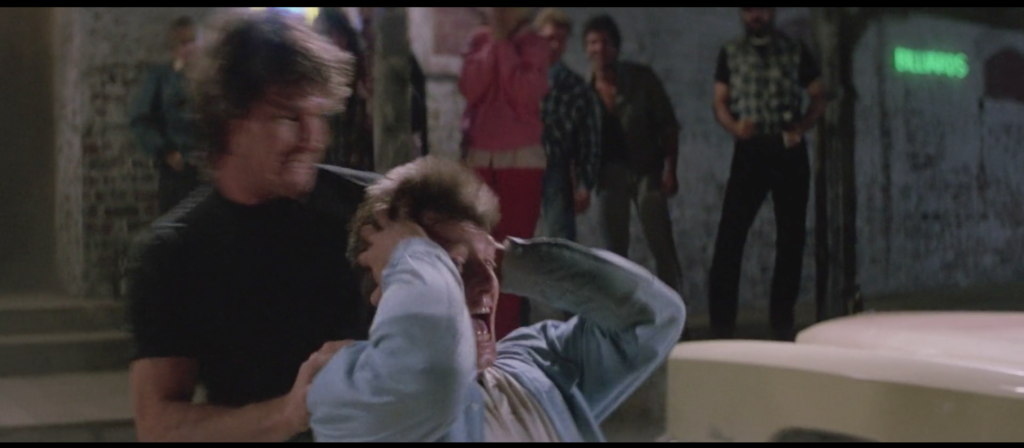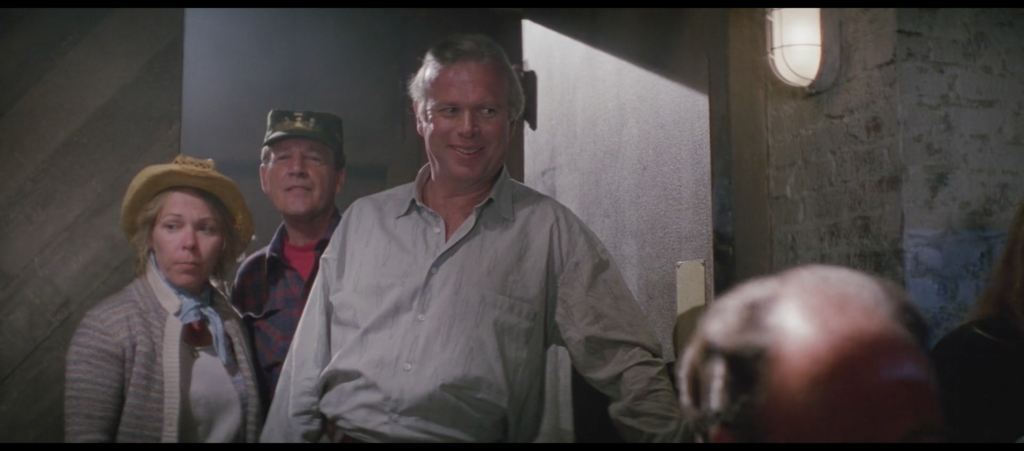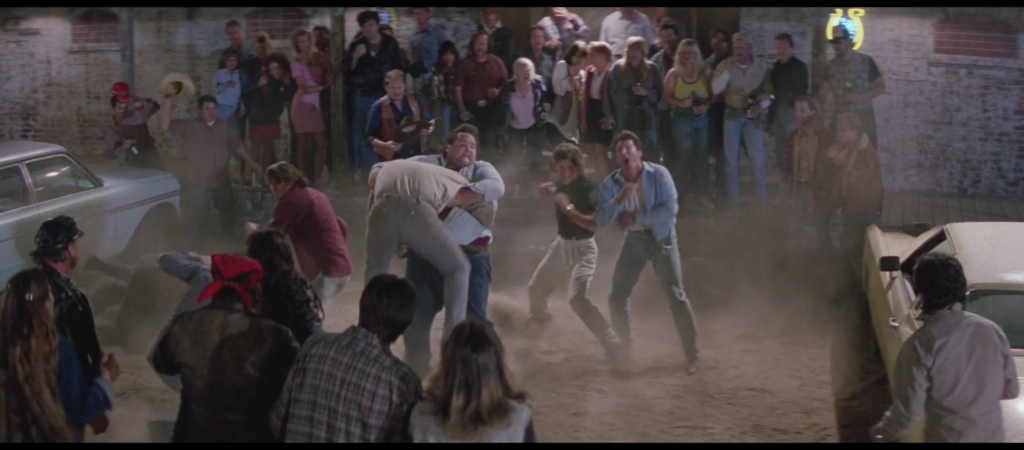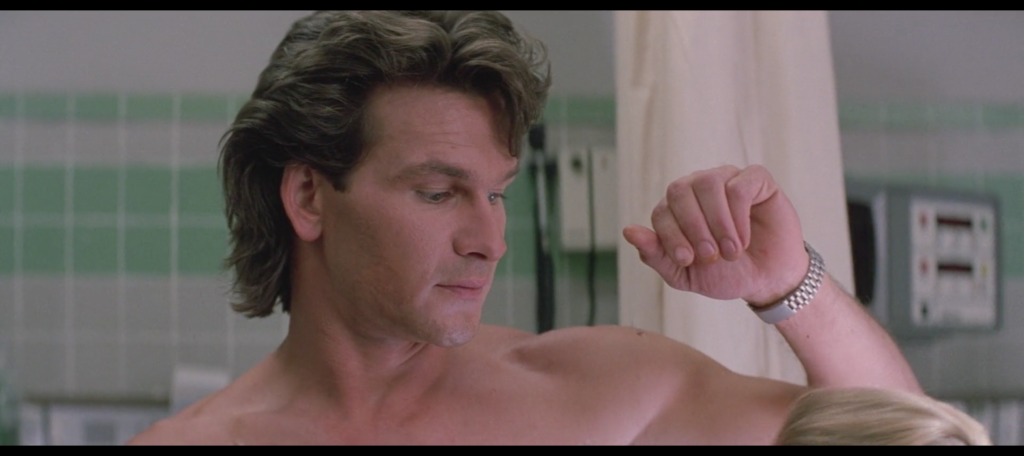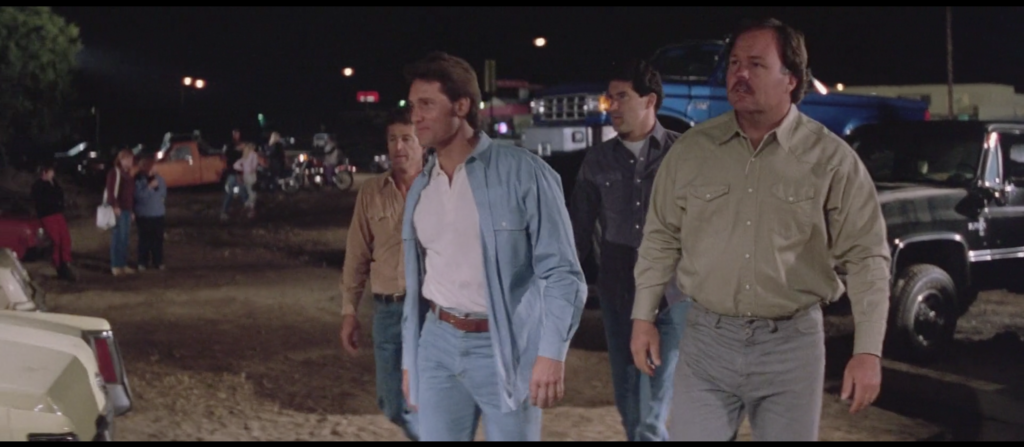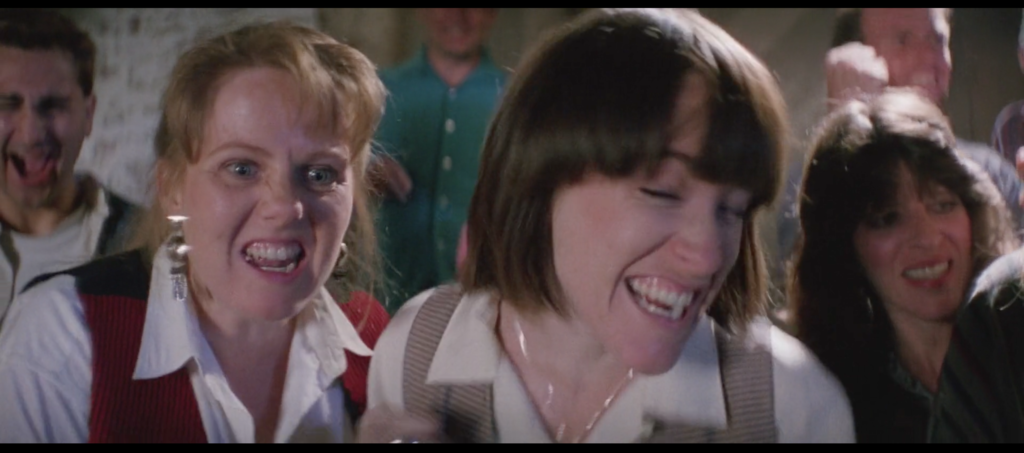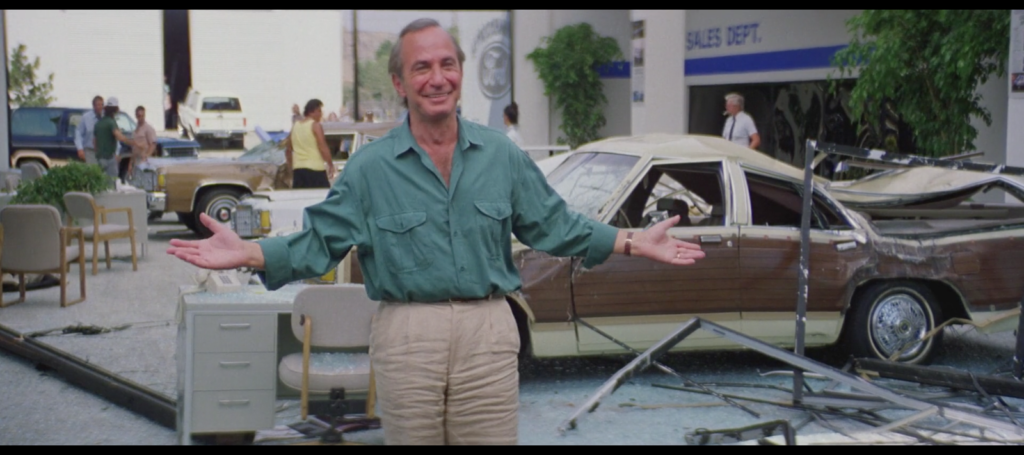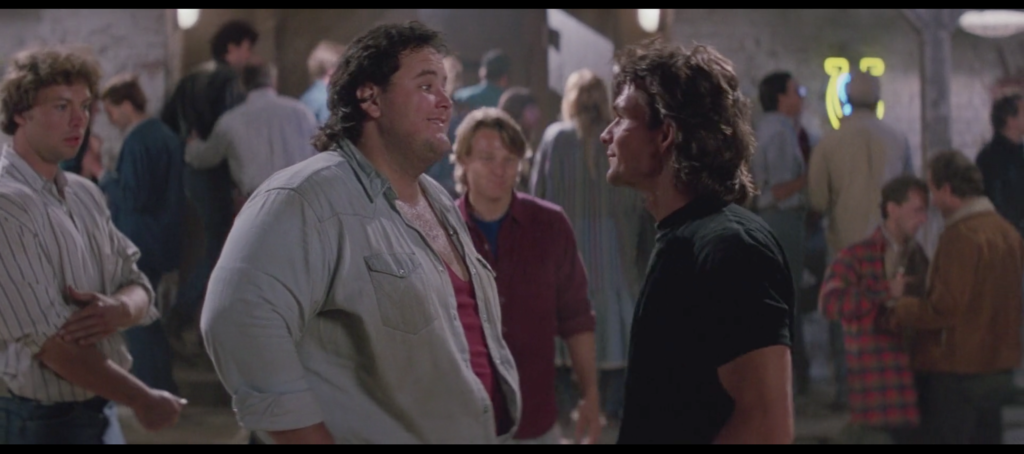Posts Tagged ‘road house’
153. “You ain’t no nice guy!”
June 2, 2019Caught completely off guard by an opponent he didn’t see coming (not yet anyway, rimshot), Dalton straight-up gives up on his date with the Doc. I’m serious, man, he just takes his balls and goes home. He drops his smile, fidgets, looks out the window, takes a final drag of his cigarette, and acts like he’s just had the completely unrelated idea that it’s time to take her home. “I keep talking, you’re gonna go off thinking I’m a nice guy.” He’s putting his pack of Marlboros into his jacket pocket, he’s smiling and raising his eyebrows and doing little head nods, haha, he’s back in business baby!
Done with looking away from this man, Elizabeth reclaims his gaze, seizes control of it. Her voice a bedroom-fireplace crackle, her smile spreading like an inkblot, she looks him dead in the eyes and says “I know you’re not a nice guy.”
Pain don’t hurt, or so we’ve been told. From this we can conclude, can we not, that Dalton is a sub, or at the very least (and given what we see of his later behavior this proves out) a switch. It follows that the moment Dr. Elizabeth Clay smiles at him while calling him a piece of shit is the moment Dalton falls in love with Dr. Elizabeth Clay.
It will all go very smoothly from there, I’m quite sure.
Take it away, Larry Underwood and friend.
“Sure,” she said, cringing back and starting to cry. “Why not? Big star. Fuck
and run. I thought you were a nice guy. You ain’t no nice guy.” Several tears
ran down her cheeks, dropped from her jaw, and plopped onto her upper chest.
Fascinated, he watched one of them roll down the slope of her right breast and
perch on the nipple. It had a magnifying effect. He could see pores, and one
black hair sprouting from the inner edge of the aureole. Jesus Christ, I’m going
crazy, he thought wonderingly.“I have to go,” he said. His white cloth jacket was on the foot of the bed. He
picked it up and slung it over his shoulder.“You ain’t no nice guy!” she cried at him as he went into the living room. “I
only went with you because I thought you were a nice guy!”The sight of the living room made him feel like groaning. On the couch where
he dimly remembered being gobbled were at least two dozen copies of “Baby, Can
You Dig Your Man?” Three more were on the turntable of the dusty portable
stereo. On the far wall was a huge poster of Ryan O’Neal and Ali McGraw. Being
gobbled means never having to say you’re sorry, ha-ha. Jesus, I am going crazy.She stood in the bedroom doorway, still crying, pathetic in her half-slip. He
could see a nick on one of her shins where she had cut herself shaving.“Listen, give me a call,” she said. “I ain’t mad.”
He should have said, “Sure,” and that would have been the end of it. Instead
he heard his mouth utter a crazy laugh and then, “Your kippers are burning.”She screamed at him and started across the room, only to trip over a throw-
pillow on the floor and go sprawling. One of her arms knocked over a half-empty
bottle of milk and rocked the empty bottle of Scotch standing next to it. Holy
God, Larry thought, were we mixing those?He got out quickly and pounded down the stairs. As he went down the last six
steps to the front door, he heard her in the upstairs hall, yelling down: “You
ain’t no nice guy! You ain’t no—”He slammed the door behind him and misty, humid warmth washed over him,
carrying the aroma of spring trees and automobile exhaust. It was perfume after
the smell of frying grease and stale cigarette smoke. He still had the crazy
cigarette, now burned down to the filter, and he threw it into the gutter and
took a deep breath of the fresh air. Wonderful to be out of that craziness.
Return with us now to those wonderful days of normalcy as weAbove and behind him a window went up with a rattling bang and he knew what
was coming next.“I hope you rot!” she screamed down at him. The Compleat Bronx Fishwife. “I
hope you fall in front of some fuckin subway train! You ain’t no singer! You’re
shitty in bed! You louse! Pound this up your ass! Take this to ya mother, you
louse! “The milk bottle came zipping down from her second-floor bedroom window. Larry
ducked. It went off in the gutter like a bomb, spraying the street with glass
fragments. The Scotch bottle came next, twirling end over end, to crash nearly
at his feet. Whatever else she was, her aim was terrifying. He broke into a run,
holding one arm over his head. This madness was never going to end.From behind him came a final long braying cry, triumphant with juicy Bronx
intonation: “KISS MY ASS, YOU CHEAP BAAASTARD!” Then he was around the corner
and on the expressway overpass, leaning over, laughing with a shaky intensity
that was nearly hysteria, watching the cars pass below.“Couldn’t you have handled that better?” he said, totally unaware he was
speaking out loud. “Oh man, you coulda done better than that. That was a bad
scene. Crap on that, man.” He realized he was speaking aloud, and another burst
of laughter escaped him. He suddenly felt a dizzy, spinning nausea in his
stomach and squeezed his eyes tightly closed. A memory circuit in the Department
of Masochism clicked open and he heard Wayne Stukey saying, There’s something in
you that’s like biting on tinfoil.He had treated the girl like an old whore on the morning after the frathouse
gangbang.You ain’t no nice guy.
I am. I am.
But when the people at the big party had protested his decision to cut them
off, he had threatened to call the police, and he had meant it. Hadn’t he? Yes.
Yes, he had. Most of them were strangers, true, he could care if they crapped on
a landmine, but four or five of the protestors had gone back to the old days.And Wayne Stukey, that bastard, standing in the doorway with his arms folded
like a hanging judge on the big day.Sal Doria going out, saying: If this is what it does to guys like you, Larry, I wish you were still playing sessions.
He opened his eyes and turned away from the overpass, looking for a cab. Oh
sure. The outraged friend bit. If Sal was such a big friend, what was he doing
there sucking off him in the first place? I was stupid and nobody likes to see a
stupid guy wise up. That’s the real story.You ain’t no nice guy.
“I am a nice guy,” he said sulkily. “And whose business is it, anyway?”
A cab was coming and Larry flagged it. It seemed to hesitate a moment before
pulling up to the curb, and Larry remembered the blood on his forehead. He
opened the back door and climbed in before the guy could change his mind.“Manhattan. The Chemical Bank Building on Park,” he said.
The cab pulled out into traffic. “You got a cut on your forehead, guy,” the
cabbie said.“A girl threw a spatula at me,” Larry said absently.
The cabbie offered him a strange false smile of commiseration and drove on,
leaving Larry to settle back and try to imagine how he was going to explain his
night out to his mother.
152. It’s a dirty job
June 1, 2019Let the negging commence. With his typical poetic elision and equally typical lack of awareness as to how he might come across to a normal person, Dalton has given the Doc his best guess as to why he’s been so successful as a bouncer and cooler: “The ones who go looking for trouble are not much of a problem as someone who’s ready for them. I suspect it’s always been that way.” But here comes trouble he’s not ready for at all: the kind of withering, barely-worth-the-effort condescension and contempt he’s shown to lesser men throughout the film, aimed right back at him.
As soon as he’s done epigrammatically gassing himself up and righting a listing derelict sitting nearby—acting on a signal from Elizabeth, who nods in the man’s direction to tip him off—he turns back and exchanges a smile with his date. How can she resist the charms of a knight errant?
“Somebody has to do it,” she says, smiling broadly, broadly enough that he doesn’t notice that she’s saying his job is quite stupid.
“Somebody’s gotta pay somebody to do it,” he replies in another typical rhetorical ploy, the poet/workin’ man two-step. Here’s my eloquent summary of my raison d’être, here’s me rollin’ up my sleeves, scratchin’ my balls, and takin’ out the trash.
Taking her eyes off of him, looking down at the table or into her own lap, smiling almost ruefully, she says “Might as well be you.” She says it like Larry Underwood’s mother sighing about the trouble her son the famous musician has gotten himself into out there in The Stand. All the things you could have done with your life, James Dalton, and this is what you choose. Not a question, a statement. This is what you are. Okay. If that’s the way it has to be.
Her smile becomes a ghost and then vanishes altogether. Dalton’s follows as if it has no choice in the matter at all. Not in this matter.
Dalton has no comeback here. Larry would hem and haw and mewl a bit before finally giving in; Dalton, a trained fighter, knows when he’s been beaten. The disapproval, the disappointment, is worse than the trouble itself. It is the trouble. Trouble he was not ready for at all.
151. You simply hate to see it
May 31, 2019The Doc is no fan of barfights. Good heavens no! Not even the ones that take place in parking lots outside the bar and thus run less risk of concussions on tables and whatnot. I mean, look at her! Here she is, sauntering up to the Double Deuce in her finest gingham clubwear, absolutely shocked and appalled and a little bit disgusted and a tiny tad outraged to see that a bar so well known for its barfights that she cracks jokes about it to patients who’ve incurred injuries there is hosting a barfight. Treating the wounded is one thing, but watching the wounding is quite another, apparently! Anyway in about a minute she’ll make googly eyes at the winning combatant and tell him he’s what she’s looking for, so she gets over it. You could probably chalk up the disconnect to Rowdy Herrington directing Kelly Lynch like a showdog rather than a human actor, you can probably hear him say “You’re disgusted, you see it and you can’t believe it, you’re wincing it’s so painful even to look at” and her thinking well it’s a living and giving him that ooooh face with all she’s got. But that is the coward’s way. Here at Pain Don’t Hurt we attribute agency to accident and thus we can interpret this as Dr. Elizabeth Clay blanching at the sight of the source of her income stream. Given that she was once married to Brad Wesley it’s not a half-bad interpretation, when you get right down to it. Dr. Elizabeth Clay is a student in the art of ignoring the obvious until it’s too late to look away.
150. Ready for trouble
May 30, 2019“The ones who go looking for trouble are not much of a problem as someone who’s ready for them,” Dalton tells Dr. Elizabeth Clay, immediately before reaching over to effortlessly keep an exhausted old drunk from passing out and falling right off his chair at the counter. Here we see the flipside to Dalton’s obliviousness to his true nature as discussed in the previous entry. The reason Dalton fails to consider the ways in which he has gone looking for trouble throughout his life is because, as a matter of day-to-day life, he is more actively aware of and invested in preventing trouble from finding others. Making ready for trouble rather than looking for it is what occupies his mind. I’d call this self-flattery or even narcissism if it weren’t for the fact that, well, he kept that old man from falling off his chair, didn’t he?
149. Which Side Are You On
May 29, 2019I could write an essay a day about Road House for a full calendar year and never come close to summarizing Dalton as neatly as this: He tells the woman he will come to love “The ones who go looking for trouble are not much of a problem as someone who’s ready for them” as if it’s never occurred to him that a man who beats up other men for a living might be the former instead of the latter.
148. The ones who go looking for trouble
May 28, 2019Dalton is always better than his opponents, pretty much. He’s never been put down, not really. This much we learn from leading questions by Dr. Elizabeth Clay during her date with Dalton at Bonnie’s Grill. One can assume we’re joining the questioning already in progress given the uncomfortably long period of silence prior to the first one, during which she takes a sip of her coffee and he takes a drag of his cigarette. That’s not the awkward pause of two people just beginning a conversation and waiting for someone to voluntarily select the starting line. That’s the awkward pause that has onlookers going “yikes.”
But these are the facts as Dalton and the Doc have established them. Dalton is superior. Dalton is undefeated. Only one question remains, and the Doc, and displaying the diagnostic acumen that’s made her the finest student of Hippocrates in the Jasper, Missouri metropolitan area, asks it: “How do you explain that?”
“The ones who go looking for trouble are not much of a problem as someone who’s ready for them,” he replies. [Sic.] “I suspect it’s always been that way.”
While Dalton garbles his response the intent is clear enough. Troublemakers are no match for people who’ve spent some time, or in his case their entire professional lives, preparing for them. Never underestimating your opponent, expecting the unexpected, you know the drill.
But this isn’t just an explanation, it’s a demonstration.
Consider Elizabeth’s questions pertaining to Dalton’s win-loss record. She’s already been disabused of the notion that his vast array of injuries indicates he loses his fights during his visit to the ER, but how, exactly? With his zen-clear response that nobody ever wins a fight. He doesn’t just “nuh-uh!!” her, he recalibrates her view of combat.
Now look at what he does here. “Are you always better than they are?” “Pretty much.” “Never been put down?” “No, not really.” Look how expertly he dodges, rather than parries, her thrusts. He’s not going to assert outright that he’s always the better man; yeah, pretty much, sure, I guess. He’s not going to state unequivocally that he’s never been put down; no, not really, I mean at the very least he gets up at the the end while the other guys don’t, pretty much, it’s complicated but yeah, no.
Despite the third degree delivered in a raspy and intimate bedroom voice, and despite the tense and awkward atmosphere (watch this space), Dalton does not wilt before her merciless gaze. He’s going to yield just enough ground each time to deny her the me vs. you framework she’s reaching for. He’s going to involve her in making her own determinations on each question in such a way that does not require her to ever explicitly contradict him. She can cling to the “pretty much” and the “not really” if she’s determined to do so…which, due to the presence of the “pretty much” and the “not really” in the first place, she’s less likely to do.
The ones who go looking for trouble are not much of a problem as someone who’s ready for them.
If you think this sentence is confusing, then change one pig.
147. Look Back in Anger
May 27, 2019In addition to “embedding a knife in a boot” and “murdering Wade Garrett” and “being Mister Clean Jeans,” Ketchum has a leg up (wink!) on his fellow goons in one other respect: He is outraged that Dalton has the temerity to whip his ass. “Son of a bitch!” he shouts at the cooler as Captain Turner pulls him away, one boot on, one boot somewhere above the streets of Jasper. It’s the same verbiage employed by Carrie Ann when she brains some drunken dipstick with a beer bottle in the middle of that full-scale riot within the bar earlier in the film. She’s just a working woman trying to make a living and not get groped or punched or forced to bear witness to other people enduring the same. Ketchum is a paid killer who just attempted to murder a man by kicking him in the skull with a knife-shoe. That man intercepted the killing Rockette maneuver and simply followed the Three Simple Rules in response. But does this keep Ketchum from acting like he’s the wronged party once things don’t go the way he wants them to? Heavens no. Not one for simply going quietly and licking his wounds is Ketchum. One last “how dare you sir,” in modern vernacular of course, is required before he drifts away, allowing Dalton to go on a date with Dr. Elizabeth Clay that will change the lives of all three of them. (Death changes your life.) In Ketchum’s climactic whinge you hear the sound of privilege. Like his boss Brad Wesley, who expresses surprise that anyone would resist him more than once as the film continues, Ketchum does not believe those he oppresses have the right to fight back. But it’s more than that: He does not believe that those he oppresses should even be able to formulate the knowledge, desire, and will the very notion of “fighting back” requires. They should be as blissfully unaware of their power in this situation as an animal that has briefly slipped loose of its bonds and, should it realize its chance for freedom is upon it, could reduce its human handler to red wreckage. But they don’t realize. Neither, according to the only form of morality the Wesleys and Ketchums acknowledge, should the hoi polloi of Jasper.
J.R.R. Tolkien once said “I think that many confuse ‘applicability’ with ‘allegory’; but the one resides within the freedom of the reader, and the other in the purposed dominion of the author” and I think about that a lot.
136. (There’s A) Fire in the Night
May 26, 2019“Hi.”
“Hi.”
“So, you lookin’ for somebody?”
“You.”
You’ve just read the conversation Dalton has with Elizabeth when he spots her and her dress outside the Double Deuce. She’s leaning back against a post, a pose she’ll have occasion to revisit later in the course of their relationship. He’s just finished whipping someone’s ass, which, same. They have an easy and unmistakably sexual intimacy here that the film spends the following scene, depicting their coffee date at a local greasy spoon, blows to smithereens. Yet it’s really only upon repeated viewings that the Doc’s repeated and rather open and vicious skepticism regarding Dalton’s career and character alike becomes apparent. Rather it reads like a tiger and tigress sizing each other up, deciding whether when and where to fuck, knowing they have within them the power to annihilate each other but choosing to do something else to each other instead, something hot to the touch and sweet to the skin. I credit Kelly Lynch and Patrick Swayze with much of that, since there’s hardly a person either character meets at any point in the movie you can’t imagine jumping right into the sack with them with the slightest provocation, and that’s no less true here. But mostly I credit the band Alabama and their song “(There’s A) Fire in the Night.”
Despite spending the better part of my adult life among music critics and music nerds and being both myself, I’ve never heard Alabama so much as mentioned outside country circles. Whatever it is that’s allowed my cohort to deify Johnny Cash and Dolly Parton and Willie Nelson, make a crossover star out of Kacey Musgraves, turn Garth Brooks’s “Friends in Low Places” into an NYC karaoke staple, place the country affectations of Tom Petty and Stevie Nicks front and center in their respective late-period critical celebrations, and allow Lil Nas X & Billy Ray Cyrus’s “Old Town Road” to happen has never touched the biggest band in the history of the genre.
Listening to this song it is very, very difficult to understand why. Occupying the overlap position in the Bob Seger’s “Night Moves” / Bruce Springsteen’s “I’m on Fire” / The Smiths’ “There Is a Light That Never Goes Out” Venn diagram you didn’t know existed, its minimal, dry guitars and water-on-the-snare-drums ’80s beat tell help singer Randy Owen tell his tale of one great night with one helluva woman. It’s not breaking any kind of ground (except perhaps the tight and expansive-sounding vocal harmonies during the chorus) and that’s the point. It’s guiding you, expertly, through familiar territory—bedrooms you’ve slept in and the people you’ve slept next to in them and your memories of both. Who wouldn’t want to warm their hands by that fire again?
The quick cut that follows Elizabeth’s explanatory “Me” leads us directly to a night sky, blank of stars moon and cloud. The camera descends onto a red orb emblazoned with a roaring fire. It descends further still, revealing the light-up signage of a diner. It’s an echo of the opening shot, which tells you right there that what follows is, in some as yet undefined way, momentous.
But it’s that rhythmic, percussive, low guitar line that sells the mood. When you hear that, and you see the night sky, and you take in the comfortingly ersatz glow of the lights, and you identify the kind of establishment we’re visiting, your mind quite naturally imagines a couple in the moments between when they realize they’re going home together and when they get up to do so. That tension and reserve is all in Jeff Cook’s insistent, somehow twitchy guitar. You pick up on instantly, you contextualize it effortlessly, you know what it’s about before Randy Owen’s singing comes in and proves you right.
Things don’t go great on the date itself, as we’ll see, though again not as bad as they appear at first glance, as we’ll also see. So for me, the music is the message here, and the message speaks true. Not for nothing is our first glimpse of this scene a fire in the night. One is being kindled whether the kindling and the tinder know it yet or not.
145. Niece
May 25, 2019“Oh, that there? That there’s my niece. Helluva gal. Doctor, you know. Put her through medical school. I ever mention that? If I were a bettin’ man, and I ain’t sayin’ I ain’t, I’d put my money on ‘Yes, Red, you’ve mentioned that.’ What can I say? Ain’t every uncle knows people are out there livin’ and breathin’ on account of what your money helped teach your brother’s daughter to do. You do that, you shout it to the world. Not for them you understand, but for you! It’s healthy to give yourself three cheers now and then. Nobody else gonna do it for you. Ah well. Them’s the breaks. Now you strike me as the strong silent type. Not much for talkin’ yourself up. Man o’ your reputation doesn’t need to do his own advertising. Tried my hand in the ad game myself one time. I know, I know, it sure don’t look that way when you look around this ol’ place, but that’s just because I doubt ol’ Emmett gets the Pennysaver delivered out his way. If’n he did you’d take a look at it on that porch o’ his one mornin’ and say ‘Now that Red Webster, he’s one old geezer can make his copy *sing.*’ Yep, do it all m’self: writin’, layout, photography, the works. Price the damn sales too, naturally, and not with one o’ them fancy calculators they’re makin’ over in Tokyo or that Silicone Valley, or even down in Texas with them instruments. World’s smallest violin, that’s the only instrument a Texan’s ever played for me. Hell, I deserved it. Long story. Water under the bridge. Used the same camera to take that pic of Elizabeth as I do for all the ads, too. Now don’t get me wrong, I like the shop, I really do. Otherwise I’d just sell to Brad Wesley in toto and get the hell outta Doge. In a Dodge. Fancy that. Funny thing about Wesley is I took that picture of her the day she heard back from the county clerk that they’d finalized h—well. Not my place to say really. You ever get the chance to talk to her about that picture, why she looked so damn beautiful and serious and strong, best just sit back and let her do the talkin’. That was a day alright. Camera’s seen me through a lot, y’know. Lotta memories I mighta forgot otherwise. Nothin’ fancy, that camera. Coulda upgraded over the years I suppose, back before Wesley got his hooks in the place. I just never saw the upside to payin’ more money for a fancier version of what already worked perfectly fine. Don’t know why people ever do it any different. Thing about technology—it’s a glitterin’ lure. But once in a blue moon you can really hit folks where they live if you show ’em somethin’ they’re already fond o’ seein’. Worked at a furrier once. First job. In-house. Boss was this old-pro copywriter. Teddy, his name was. Greek. Don’t that beat all. This Teddy, he says to me ‘Red, the word you need first in your vernacular is
“new.” You give ’em the itch for new and it ain’t a matter of if they’re gonna scratch it but when. The new thing’s calamine lotion, plain and simple. But you really wanna glue the people and the product together, there’s another word you’d better learn: Nostalgia.’ Delicate thing. Potent. Pain from an old wound. That’s what it means in Greek, Teddy tells me anyway. Twinge in your heart. Leaves plain ol’ memory in the dust. That camera, it’s my time machine. Forwards, backwards, don’t matter. Anytime I got the ache to go someplace I wish I never left but can’t get back to, place makes me feel like a child, place that feels like home, I head to the darkroom. If there’s any place in God’s creation I know I’m loved…well, you’re lookin’ at it right there. Behind my niece, I mean. That’ll be $17.48 with tax, Mr. Weiner.”
144. The thousand injuries of Fortunato I had borne as I best could, but when he ventured upon insult I vowed revenge.
May 24, 2019Here’s Ketchum, the clear second to Jimmy in the hierarchy of Brad Wesley’s goons and his successor upon his death in much the same way that the unspecified entity Gothmog assumed control of the assault on Minas Tirith following the death of the Witch-king of Angmar, getting dragged out of the Double Deuce on his ass into the dirt parking lot outside. Bumpty bumpty bump, right down the front steps, squealing and mewling over his injured ankle all the way. In a matter of seconds, Dalton thwarted his assassination attempt, caught his leg in midair, ruthlessly twisted it, yelled “You’re too stupid to have a good time!” right in his face, toppled him to the ground, and dragged his ass, literally, into the dirt, also literally. Such is the indignity of this forced exit that, get this, his extended free leg is actually what opens the right-hand door (facing the building) while Dalton shoulders open the left. He is forced to facilitate his own humiliating defeat.
Now in addition to being the most anonymous of Wesley’s core goons, Ketchum is also the least sympathetic. My guess is that the two phenomena are interrelated. Can’t feel sympathy for a guy you can’t remember!
But recall that in the world of the story, Ketchum is a thought leader, a ring general , a man to whom the Tinkers and Bleeders and sister-sons of the world are supposed to look for guidance. Both Tinker and O’Connor—Tinker! and O’Connor!—fare better in their fight against Dalton than Ketchum does in his. Dalton beats Ketchum like a mule. To keep up the ring-general jargon, bahgawd ref, stop the damn match.
Later in the film, Ketchum murders Wade Garrett.
“They’re not my brothers,” Jon snapped. “They hate me because I’m better than they are.”
“No. They hate you because you act like you’re better than they are. They look at you and see a castle-bred bastard who thinks he’s a lordling.” The armorer leaned close. “You’re no lordling. Remember that. You’re a Snow, not a Stark. You’re a bastard and a bully.”
“A bully?” Jon almost choked on the word. The accusation was so unjust it took his breath away. “They were the ones who came after me. Four of them.”
“Four that you’ve humiliated in the yard. Four who are probably afraid of you. I’ve watched you fight. It’s not training with you. Put a good edge on your sword, and they’d be dead meat; you know it, I know it, they know it. You leave them nothing. You shame them. Does that make you proud?”
Jon hesitated. He did feel proud when he won. Why shouldn’t he? But the armorer was taking that away too, making it sound as if he were doing something wrong. “They’re all older than me,” he said defensively.
“Older and bigger and stronger, that’s the truth. I’ll wager your master-at-arms taught you how to fight bigger men at Winterfell, though. Who was he, some old knight?”
“Ser Rodrik Cassel,” Jon said warily. There was a trap here. He felt it closing around him.
Donal Noye leaned forward, into Jon’s face. “Now think on this, boy. None of these others have ever had a master-at-arms until Ser Alliser. Their fathers were farmers and wagonmen and poachers, smiths and miners and oars on a trading galley. What they know of fighting they learned between decks, in the alleys of Oldtown and Lannisport, in wayside brothels and taverns on the kingsroad. They may have clacked a few sticks together before they came here, but I promise you, not one in twenty was ever rich enough to own a real sword.” His look was grim. “So how do you like the taste of your victories now, Lord Snow?”
“Don’t call me that!” Jon said sharply, but the force had gone out of his anger. Suddenly he felt ashamed and guilty.“I never…I didn’t think…”
“Best you start thinking,” Noye warned him. “That, or sleep with a dagger by your bed. Now go.”
—George R.R. Martin, A Game of Thrones
143. We’ve met before, haven’t we?
May 23, 2019Now, I’m not saying that Dr. Elizabeth Clay is the white-magic call to the shadow-self Dweller on the Threshold response, arriving at a raucous but fraught gathering to force a handsome man who favors loose beige jackets to face his innermost desires because he is afraid to do so himself while he charts a course for confrontation with a wealthy psychotic businessman in charge of a barely disguised criminal enterprise (played by an actor of Italian extraction born in New York City in 1930), but I’m not not saying it either.
141. Dalton in repose
May 21, 2019When we find Dalton lying on his back, hands behind his head, eyes open, under a shady tree, just daydreamin’, whilin’ away the hours, conferrin’ with the flowers, consultin’ with the rain, it behooves us to review recent events in his life. In reverse order these include an astonishingly awkward first date with Dr. Elizabeth Clay, during which you’d be hard pressed to find something she said to him that wasn’t a brutal neg; a parking-lot brawl with a man with a knife in his boot, which is how Elizabeth found him when she arrived for their date; a call to his mentor Wade Garrett in which we receive the first intimations of the depths of Dalton’s concern about Brad Wesley; the discovery that Wesley and his goons are bracing local businesspeople for protection money; getting stitched up for a knife wound incurred in a previous brawl with Pat McGurn, O’Connor, and Tinker, during which process he meets Dr. Elizabeth Clay for the first time; the brawl itself, during which the knife wound is incurred. “Man, this guy has it good” is not a thought I’d have.
Yet it’s a thought radiated by every inch of his body (and magnificent hair) as he lies there on that car. A car which was destroyed—did I mention this?—by disgruntled opponents yet again, sometime between when he defeats Ketchum and the Church Elders in the parking lot and departs for his date with the Doc and when they return to the lot later that night. They pulled a stop sign out of the ground and shoved it through his front windshield, man. I’m not having much trouble reading the symbolism there, but Dalton either is having that trouble, or, and this is more likely, he’s completely untroubled by it at all. He’s gonna take five on the battered body of his car, gonna kick back on that thing and take in the fragrance of nature in the parlance of Emmett’s times like it’s a hammock. He’s living easy, loving free, season-ticket on a one-way ride, asking nothing, leave him be, taking everything in his stride.
Even when Tinker and the Bleeder show up he doesn’t so much as look their way. I’ll remind you here, in case you forgot what happened a couple of paragraphs ago, that Tinker is the man who sent him to the hospital with a knife wound, and O’Connor is the man who helped set him up for that injury. Dalton proceeded to beat the holy hell out of O’Connor while his bouncers doubled up on an immobilized Tinker like they were hitting the heavy bag. There’s no reason for Dalton not to believe these men have come to kill him, because they’ve already tried. I wouldn’t imagine blowing it has cooled their enthusiasm for the prospect.
But that’s Dalton right there, chilling TF out on a vehicle trashed by his mortal enemies, in a body also trashed by his mortal enemies, as his mortal enemies approach.
And yet they are the ones who flinch the second he moves. This despite outnumbering him. This despite being on their feet while he has to get up from a supine position. This despite the fact that, you know, the reason they’re there is to get him to get up and come with them, like him getting up and coming with them is baked right into the premise of their little errand here.
But—and I can’t believe I’m saying this given my strong anti-goon bias—goons sometimes see things the rest of us cannot. (Maybe it’s the sunglasses.) O’Connor and Tinker don’t see a man mellowing out despite all the signs surrounding him that he should not. They see a rattlesnake sunning itself on a rock. You ever seen something like that? They look pretty chill too. Pretty calm, pretty relaxed, pretty vulnerable. I’m not about to fuck with one though and neither are you, are you. We see the kinetic inherent in the potential. We remember the Good Book: The serpent is subtle.
139. Dress from an Italian Restaurant
May 19, 2019A bottle of white
A bottle of red
A smashed beer bottle on a drunk guy’s head
We’ll climb on tables with our feet
Near the chickenwire stage
You and I, filled with rage
A bottle of red
A bottle of white
Regularly scheduled thing for Saturday night
You’ll wear a tablecloth you got
From an Italian restaurant
Things were okay with me those days
I got a good job, I got out of Memphis
I fucked a dude’s wife, ripped out his windpipe
And I didn’t do time
Oh, we’d just met days ago
You’d just healed my torso
“Nobody ever wins a fight” was my pickup line
You remember those days getting nude in a refurbed barn
My enemy watched as we fucked on an old man’s farm
Oh, we didn’t bother to kiss, who needs foreplay when you’ve got charm
Cold beer, fist fights
My sweet romantic Jasper nights
Oooh, hoo
Yeah, yeah
Wooo, hoo
Ohh, ohh, ohh
Oh oh
Oh oh
Oh oh oh oh ohh
Oh oh
Oh oh
Oh oh oh oh
Dalton and Wesley were the hero and heavy
Of a film that initially bombed
Swerving around with the car top down
And tai-chi on the lawn
Nobody looked any finer
And they both put their dicks in the Doc’s vagina
But Jeff Healey knew and implied Doc was Wesley’s ex-wife
So it’s Dalton and Wesley and only one man will survive
Oh oh
Oh oh
Oh oh oh oh ohh
Oh oh
Oh oh
Oh oh oh oh
Dalton and Wesley were getting real petty
In a film in 1989
Wesley decided to cut off the Double Deuce liquor supply
Everyone said they were crazy
Wesley had goons who were much too lazy
And Dalton was dueling a guy with a boot with a knife
Oh, but there were were watching Dalton call Wade for advice
Oh oh
Oh oh
Oh oh
Well, he opted to send for his wise old mentor
Who had taught him to bounce with no fears
He’d feathered his nest where the girls shook their breasts
And drunk soldiers could ogle their rears
He was grizzled and louche and he said “Double Douche”
And his bloodstream’s primarily beers
A-whoa oh oh oh
Oh oh oh oh
Wade Garret’s old
Oh oh
Oh oh
Oh oh
Well, they fought for a while in a very nice style
But it’s always the same in the end
Wade Garrett got knifed and it cost him his life
(Though he’d shown off his pubes to his friends)
Then the old men got mad and massacred Brad
Right after Dalton killed all of his men
Oh oh oh oh
Oh oh oh oh
Dalton and Wesley had had it already
By the end of 1989
There was no way to know
We’d be watching this show
For the rest of our lives
It influenced Mystery Science
Extensively cut for network compliance
And soon was a staple of watching on cable while high
Oh, and that’s all I heard about Dalton and Wesley
One was Gazzara and one was real sweaty
And here we are waving Dalton and Wesley goodbye
Oh oh
Oh oh
Oh oh oh oh ohh
Oh oh
Oh oh
Oh oh oh oh ohh
Oh oh
Oh oh
Oh oh oh oh ohh
Yeah, yeah, yeah
A bottle of red
Ooh, a bottle of white
Whatever works so pain don’t hurt tonight
Just wear that tablecloth you got
From an Italian restaurant
137. Tableau IV
May 17, 2019“I think that if you’re gonna write about war and violence, show the cost. Show how ugly it is. Show both sides of it. On the other side—which sometimes gets me in trouble from the other side of the political spectrum—is the glory of war, which those of us who are opposed to war and would rather not have war tend to forget about, or try to pretend it doesn’t exist. But if you read the ancient historical sources, people are always talking about the glory of war, the banners that stirred the heart, the banners in the wind.” —George R.R. Martin
136. Natural causes
May 16, 2019“How’d this happen?” Dr. Elizabeth Clay asks Dalton comma James while observing the yawning knife wound in his side. “Natural causes,” he responds, staring at her. “Looks like a knife wound,” she says skeptically, after fingering the skin around the gash; not the first doubter to touch a man’s wound. “Like I said,” he replies, handing her his medical files. (“Saves time,” you’ll recall.)
But I want you to take a good look at this shot. Look at Dalton, naked from the waist up, seated obediently as a woman touches him where he is most vulnerable. Look at the top of the head of Dr. Clay (that’s how she introduces herself, all business, appropriately), her face approaching waist level, looking intently at the liminal place where his body is extruding its vital fluid into the outside world. Look at his eyes as he looks down at her, as hungry and urgent as those of a well-trained but young and rambunctious dog eyeing a Milk-Bone.
Dr. Clay has yet to so much as meet Dalton’s gaze, intent as she is on triage. When she does finally see him, really see him, it’s through the protective panes of her enormous, almost vaudevillian eyeglasses. But Dalton has no such prophylactic barrier in place. He sees her, really sees her, right away. By this I mean he sees her ideal self: a healer, a caregiver, a person who mends bodies rather than breaking them.
“Nice place—they send a lot of business my way,” she jokes when they discuss his place of employment. “I’m hoping to change that,” he replies, with the pride of a Cub Scout telling his den mother he plans to win the Pinewood Derby. Right away he intuits that to get right with this remarkable woman he must recast himself as a healer as well, a healer of an ecosystem rather than an individual.
“All by yourself?” she responds, smiling, with the gently ribbing condescension a parent might use on a child she’s unsure will pick up on the tonal cues when that child announces his intention to rid their town of crime while tucking a towel into the back of his shirt as a cape. She sees him now, looks right into his eyes through those gigantic glasses, and finds him mildly risible, which he is.
What she’s really doing, it becomes apparent in subsequent scenes, is attempting to tuck her obvious physical attraction to this exceptionally physically attractive man back into his medical file where it belongs—a mere physical factoid, bodily trivia, like his nine staples, thirty-one broken bones, two bullet wounds, nine puncture wounds, and four stainless steel screws. And best of luck to her with that.
Yeah, natural causes are at work here, alright. Natural indeed.
135. Captain
May 15, 2019See this fellow on the right? The mustachioed gentlemen wearing his shirt tucked in with no belt? He’s played by a football player turned stuntman, stunt coordinator, actor, and second unit director named Allan Graf. With that series of job descriptions you might expect him to have played a role in other fight scenes besides the one where Dalton disarms, or dislegs I suppose, a guy with a knife embedded in his boot. And you’d be right.
Graf is also Captain Joe Turner, bodyguard and enforcer for George Hearst, in Deadwood, another Western largely shot in bars about people jockeying for control of a small town overrun by a rich asshole. As such he is one half of the best fight scene ever filmed: the street fight against Dan Dority (W. Earl Brown), the Captain’s opposite number in local pseudo-respectable crime boss Al Swearengen’s outfit. I’ll never forget the first time I watched this scene because after it was over I had a splitting headache. Was it sympathy pain, I wondered, until I realized I’d been holding my breath for probably a minute and a half before the tide, as it were, turned in the favor of my favored combatant. I was so on edge I literally stopped breathing.
As much as I think the fight scenes in Road House are fantastically choreographed, acted, and shot, nothing in the film rises to that level. But that’s fine, as few fight scenes ever have. And for what it’s worth, the eventual mano a mano between Dalton and Jimmy is legit one of the most exciting and technically fantastic fights I’ve ever seen in a movie. But without the pathos generated by David Milch’s town full of grasping ravenous brutes and people who get so angry at the resultant shit through which they’re forced to wade that they start to cry, it’s simply playing a different sport than the one for which Mr. Allan Graf got down in the mud as one half of the greatest game ever played.
134. Nobody ever wins a fight?
May 14, 2019Here are Stella and Carrie Ann, the waitstaff at the Double Deuce, watching Dalton, Jack, Hank, and Younger, the bouncers at the Double Deuce, whip the shit out of Ketchum and his pals, would-be assassins at the Double Deuce. They leer and cheer from the sidelines like extras shown in slo-mo during a Rocky movie when someone’s getting absolutely beaten senseless, only they’re not in slo-mo, they’re in glorious real time. Representative dialogue: “GO ON GO KICK HIS AAASSSSSS!” When the dust settles and the last man goes down you can hear Carrie Ann’s distinctive white-soul rasp: “ALLLRIGHT! YEAH!” She sounds as satisfied as Matthew McConaughey lighting a spliff after having sex for two hours.
And why shouldn’t she? Carrie Ann, we’ve seen, was the victim of sexual harassment we can safely assume was constant until Dalton showed up and announced “It’s going to change.” Stella was almost certainly in the same boat. For untold years, these two women had to take drink orders from men who would convert those drinks into that many more ass-pinches and face-punches. We’ve watched both women resort to using beer bottles as weapons to try and stem the tide of violence in their own favor.
The Double Deuce was an absolute hellhole, a Missouri Mos Eisley Cantina, the Inn at the Crossroads during Lannister rule, Rick’s if Bogey was playing his character from In a Lonely Place and Peter Lorre was the child killer from M and Claude Rains was the Invisible Man. It was a hideous, soul-destroying place to work. It’s a miracle these women made it out emotionally intact.
But it ain’t like that anymore, and I can’t imagine Carrie Ann and Stella are nuts about anyone who’d like to restore that particular status quo ante. They recognize Ketchum and his church potluck pals for what they are. You see in their faces and hear in their voices the hunger of people who are finally getting to see their oppressors get theirs. I’d like to see these faces and hear these voices much, much more often.
113. Pants
May 13, 2019Brad Wesley’s pants are a mess. Look at those wrinkled-ass trousers. Like an elephant’s trunk, twice, in khaki. This is his apotheosis right here, his truest moment of pure power, the point at which instead of blowing up buildings in the middle of the night with no one looking he feels able to order his man to run over a Ford dealership in a monster truck in broad daylight with a crowd of like two hundred witnesses watching. Dalton’s there, the owner of the Ford dealership is there, Wade Garrett is there, his own ex-wife Elizabeth is there, and guess what, the man don’t give a fuck, this is his town, don’t you forget it, but apparently the dry cleaners is not included. Those pants are the visual equivalent of him crowing about having the raw kingmaking power to open a JC Penney. What the hell was Ben Gazzara doing to wrinkle his pants up like that? Did no one from wardrobe intervene? Did they think it made for a nice feet-of-clay visual shorthand and just let it slide? Jimmy, couldn’t Jimmy have said something? Ketchum, a man who looks like he was born starched, what about him? Will no one tell Brad Wesley his pants are embarrassingly wrinkled? Is this what it feels like to be truly alone, even with the world at your feet? Standing in front of your great triumph over your enemies and looking like a goddamned fool and you have no friends to say so? What? Is up? With the pants?
The Stand is Stephen King’s best book, I decided about three decades into my career of reading and re-reading Stephen King books. One of the many reasons I think this involves a fellow name of Starkey. Starkey’s a military guy, brass, way up on the totem pole but it’s a totem pole they keep hidden in the dark at all times. He was in charge of the bioweapons project that had a little hiccup and started to destroy the human race, and so he’s in charge trying to halt that destruction. He’s also in charge of trying to cover it up, first under the pretext that it will buy them a few extra days to find a vaccine or a cure before panic sets in, and then mostly out of sheer force of American military habit.
The thing about Starkey is that as time goes by and it becomes increasingly clear he won’t be earning any medals for this one, to say the least, he grows fixated on the security monitors that show him the inside of the facility where Captain Trips emerged and started drowning everyone in their own snot while their brains boiled. At first this happened much faster than it does later, for reasons that I don’t think the book ever quite makes clear, and even if it did the idea of a flu virus that kills in under a minute the same way a regular flu virus would kill over the course of several days is science-fictional even for The Stand.
Be that as it may. The important thing for Starkey, less important than other things really but increasingly important to him as the bodies pile up outside that’s for sure, is that one of the people in that facility died in the cafeteria, just dropped dead at his seat, and when he did his face fell right into his bowl of soup. The soup starts congealing and getting really disgusting, which is the case with everything else that used to be warm and made of organic material down there, but the soup and the face in the soup are what start to bother Starkey, and bother him bad.
It’s the indignity of it, you see. This fellow in the lab, for all anyone knows his face will remain in that bowl of awful soup for…well, for as long as it takes for the site to be deemed sterile enough to enter at first, and then, when it becomes clear no one will be left alive to enter it, for all eternity. Starkey just stares and stares at this guy with his face in the soup. Did I mention Starkey also gave the order to have secret agents in Russia and China open vials of the flu without ever telling them what they were doing, just to make sure that when America dies she takes the rest of the world with her? Yeah, but anyway the soup. It’s just not right, a man dying like that, like a slob, like a joke. Something must be done.
Anyway, I’ve been thinking a lot about Brad Wesley’s pants. They’re wrinkled, is the problem. See? See? See?
132. Jack reacts
May 12, 2019Jack is Dalton’s most promising student, his protégé, the Dalton to his own Wade Garrett. He’s the quickest both physically and mentally, he sees things others do not, he is seldom far from Dalton’s side (except when duty-bound to be elsewhere of course), he shares his observations of the world and receives Dalton’s in turn. Throughout, whether with the genuine happiness of “I didn’t know she could sing!” or the shocked disbelief of “Jesus Christ!” or the exasperated incredulity of “This is a Sears credit card,” he is never less than a hundred percent open to the world and honest in his reactions to it. He moves through life the way one should, even before the Dalton Path lies before him.
But now that it does, even his wordless responses evince that same willingness to take life as it comes. Witness how he handles Dalton’s extremely utilitarian advice following the throwdown with Ketchum and the Men Who Iron Their Jeans Gang. “Give me the biggest guy in the world: You smash his knee, he’ll drop like a stone,” Dalton says, and QED. Jack, however, does not react the way one might to fighting tips, but the way one might to good old-fashioned common sense one has never had the common sense to figure out for oneself until a wiser soul relays it. His eyes widen, his head tilts, his eyebrows go up, he nods slightly, and his smile says “Huh, I’d never really thought about it that way before, but you’re right!” It’s as if Dalton just said “Don’t worry, you won’t have trouble making it to the Fotomat before closing—school’s out, so traffic’s gonna be lighter this afternoon,” or “If you tell the kid no, he’s just gonna sneak in, so at least buying him the ticket to the R-rated movie yourself keeps the lines of communication open.” “Oh yeah,” says Jack’s face, “good point!” Which it is, I suppose, if faced with a big guy and a knee. But Jack teaches us here as much as Dalton does.

